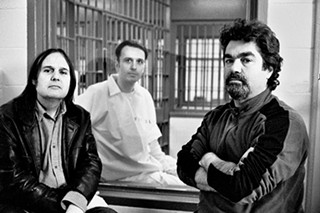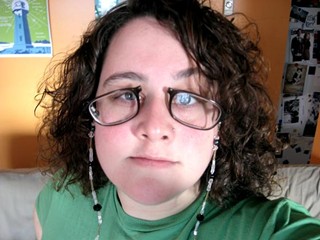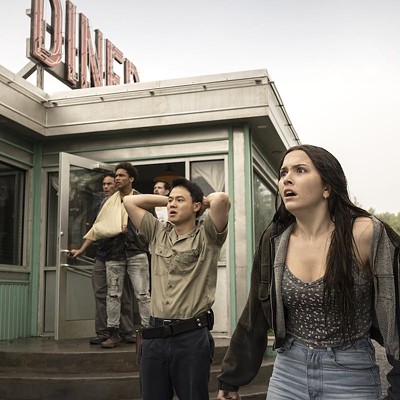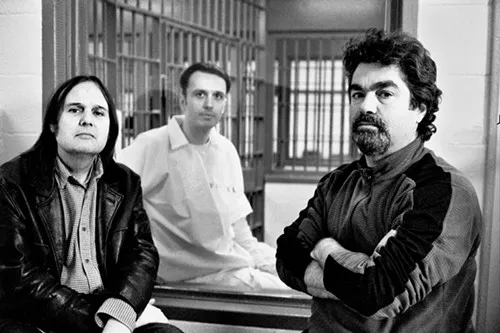
Imagine making a movie that got some wrongfully convicted people out of prison, but not in enough time to fix the movie? That’s what happened to Joe Berlinger and Bruce Sinofsky, whose Paradise Lost 3: Purgatory was finished on August 15. Four days later, the three men they’ve been following for nearly twenty years who’d been convicted of killing three young boys were released from prison.
(A publicist made a speech before our screening; the directors are furiously working to add 12 new minutes to the film before its New York Film Festival debut in two weeks.)
Opening and closing with awful Metallica songs and helicopter shots that combined to remind me of Lost Boys 2, Purgatory is the final in a trilogy including The Child Murders at Robin Hood Hills and Revelations, HBO docs which covered the struggles of Damien Echols, Jason Baldwin and Jessie Misskelly, known as The West Memphis Three, who were convicted of murdering three eight-year-old boys in West Memphis, Arkansas in 1994. It was a town out for blood, and the three black-wearing, allegedly Satan-worshipping teens were good enough. (Misskelly was railroaded into a false confession.) In the ensuing decades, famous supporters like Natalie Maines and Eddie Vedder have rallied, donated and raised millions to keep the men in appeals and pushing for new trials. Newly examined DNA evidence ultimately exonerated them, a blessing and a curse—if they didn’t do it, the real killer is still out there. (Evidence currently points to one of the dead boys’ stepfather.)
Metallica aside—Berlinger also directed Some Kind of Monster—Purgatory is beautifully framed, critical but not judgmental of the law enforcement officials who fucked up and even-handed with the jailed men who are somehow not bitter or beaten by their ordeal—Echols, the only one on death row, managed to begin and maintain a 14-year relationship while in jail—and knowing how the whole thing ends, even if not exactly as in this version, is a reminder that movies can really change lives in an absolutely real way.
Hysteria is set in the 1880s in England, where modern medicine is just learning what germs are and no one will listen to the whippet slash renegade Hugh Dancy about it, so he finds himself at a lady clinic. The clinic specializes in “hysterical” women, ie sexually frustrated ones, and the doctor has designed a treatment that, to be frank, is finger-banging. Hugh is really good at it so his appointment book fills up, and then he gets an old-timey version of carpal tunnel. (I am being completely serious.) By chance he and Rupert Everett invent the first vibrator, which is what I could’ve said off the top but come on, check out those details.
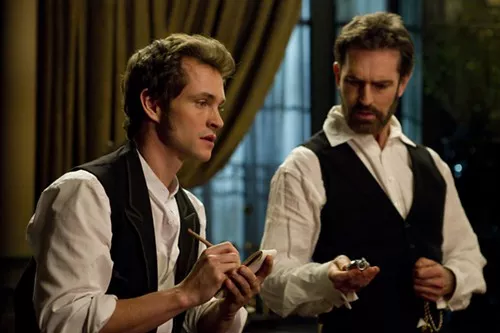
I go back and forth on Dancy—he is British so this role fits really well, he’s very handsome and funny—and I’ve started to go back on Maggie Gyllenhaal, the rebel feminist doctor’s daughter, who spends much of the movie screaming in a self-righteous fury. I’d like to see her try sweetness once, see if it makes a difference. The best part of the screening was during the end credits when they showed the vibrators of history, and a bunch of women broke out into applause when The Rabbit showed up. The movie, directed by Tanya Wexler, is a pretty conventional British run at something fun, like when Stephen Frears does a funny one. Everyone is having a lot of fun, but there are too many double entendres and stepping in horse poop to take Hysteria as any kind of statement, feminist or otherwise.

